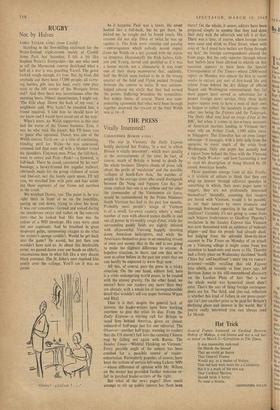THE PRESS Vi tally Interested?
ci IRISTOPHER BOOKER writes : 'The war in Vietnam,' the Daily Express boldly declared last Friday, 'is a war in which Britain is vitally interested': which must qualify as the overstatement of the year. In fact, of course, much of Britain is bored to death by the whole business. Despite clouds of pious talk about the perils of 'escalation' and the possible 'collapse of South-East Asia,' the number of people in the average street who could distinguish between Da Nang and Nguyen Cao Ky, let alone explain that one is an airbase and the other the commander of the Vietnamese air force, would be outnumbered by the Prime Ministers South Vietnam has had in the past few months. Probably most people's image of Vietnam is of a small, far-away country where a small number of men with absurd names shuffle in and out of power in tri-weekly coups d'etat, while the surrounding paddy fields are nightly infested with all-powerful Vietcong happily shooting down American helicopters, and while the Americans themselves pour in an unending stream of men and money that in the end is not going to make the slightest difference to anyone. A hopeless situation, in short, and one that we've seen so often before in the past ten years that we can hardly be expected to wave flags now.
All this, of course, puts the press in a tricky situation. On the one hand, editors feel, here is a crisis endangering world peace, to be treated with the utmost gravity. On the other hand, we mustn't bore our readers any more than they are already, with a whole lot of incomprehensible detail that wouldn't sell one paper between Wigan and Rhyl.
Thus it is that, despite the general lack of interest, the leader-writers have been working overtime to give the crisis its due. From the Daily Express—a stirring call for Britain to stand firm behind America, given an almost unheard-of half-page just for one editorial. The Observer—another half-page, warning its readers that the US mustn't fall into the cunning Chinese trap by falling out again with Russia. The Sunday Times—'Wishful Thinking on Vietnam.' Every possible angle of the subject has been combed for a possible source of reader- exhortation. Particularly popular, of course, have been the actions of certain left-wing Labour MPs —whose difference of opinion with Mr. Wilson on the matter has provided further welcome re- lief to parched leader-writers of the right.
But what of the news pages? How much attempt to stir up public interest has there been
there? On the whole, it seems, editors have been prepared simply to assume that they had done their duty with the editorials and left it at that. There was a time, of course, when foreign 'crises were meat and drink to Fleet Street, when with cries of 'As I stand here bullets are flying through my hair' the foreign correspondents cleared the front page. But the only reporter through whose hair bullets have been allowed to whistle on this occasion appears to have been the Special Correspondent of The Times—whose 2.000-word report on Monday was almost the first in recent weeks to extract any sort of first-hand life and colour from behind the dry deluge of official Saigon and Washington communiqués that for most papers have served as substitutes for a proper foreign news service. Only three daily papers appear even to have a man of their own in Saigon to collect the handouts in person—the other two being the Express and the Telegraph. The Daily Mail may lead on coups d'etat at the BBC, but when it comes to eye-witness accounts of American marines landing in Vietnam they must rely on Arthur Cook, 1,000 miles away in Singapore. The Guardian has an even longer telescope—it manages, with a little help from the agencies, to cover much of the crisis from Washington. Only one paper has actually had a report from behind the lines with the Vietcong —the Daily Worker—and how fascinating it was to read his description of being blasted by ill- aimed American bombs.
Three questions emerge from all this. Firstly, is it realistic of editors to think that they can whip up interest through editorial speeches in something in which, their news pages seem to suggest, they are not profoundly interested themselves? Secondly, assuming that readers are bored with Vietnam, would it be possible to stir their interest by more dramatic and thorough first-hand reporting in the old 'Scoop' tradition? Certainly it's not going to come from such bizarre irrelevances as Geoffrey Thursby's revelation in the Sunday Express that Vietnam was now threatened with an epidemic of bubonic plague—and that six people had already died; but judging from the splendid blow-by-blow account in The Times on Monday of an attack on a Vietcong village it might come from less attention to hand-outs and more to life. Thursby had a lively piece on Wednesday datelined 'South China Sea' and headlined 'I MEET THE US TARGET- BUSTERS'—mildly recalling that old Express brio which, as recently as four years ago, led Bertram Jones to his still-remembered discovery on the Laotian Plain of Jars that a war the whole world was hysterical about didn't exist. That's the sort of thing foreign correspon- dents are for. The third. and also sad, reflection is whether this kind of failure in our press cover- age isn't just another price to be paid for Britain's declining place and interest in the world. But if you're really interested you can always read Le Monde.


































 Previous page
Previous page